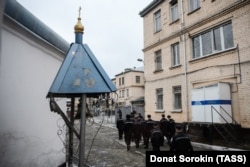By the time Russian Defense Ministry recruiters arrived at penitentiary IK-29 in the far northern region of Arkhangelsk in April, Artyom Bunyatov had already turned down two previous pitches by mercenary group representatives urging him to serve on the front lines in Ukraine in exchange for his freedom.
The 31-year-old convicted drug dealer had been warned by his mother, Larisa, not to make such a pact but instead to serve out the remaining three years of his prison term. He had no previous military training, she reminded him in a phone call.
This time, however, the cajoling finally worked. According to Larisa, the Defense Ministry officials promised him a clean criminal record and a job upon completion of a tour in Ukraine — and he signed up for combat.
The practice of coaxing and pressuring inmates like Bunyatov to serve in Ukraine may soon come to an end — but not because Russia has a surfeit of troops.
With Russian casualties estimated to be in the hundreds of thousands, no end to its invasion of Ukraine in sight, and another round of call-ups posing a political risk for the Kremlin ahead of a presidential election in March 2024, Moscow is seeking to make it legal to draft inmates to help fill the ranks.
Russian legislation currently forbids the military to register convicted prisoners for the draft or call them up for duty. But last month, the Defense Ministry submitted a proposal to remove that restriction from the law, potentially making tens of thousands of convicts fair game for deployment to Ukraine.
“It’s possible that they may start conscripting directly from prison,” a representative of Russia Behind Bars, a group that advocates for prisoners’ rights, told RFE/RL.
The representative, who asked that their name be withheld out of safety concerns, said that it could take several months after the legislation is adopted for prisons to set up the necessary infrastructure before the first convict is drafted.
But when it is complete, “then they will be able to start pulling [prisoners] indiscriminately” for military service, the representative said.
Russia currently has 266,000 convicts behind bars, Deputy Justice Minister Vsevolod Vukolov said October 4. The overwhelming majority are men.
Manpower Shortage
Russia has been eagerly tapping the penitentiary system since last year after its full-scale invasion of Ukraine in February 2022 quickly turned into a war of attrition that experts say it was completely unprepared for.
As Ukraine’s troops routed Russian forces in the Kharkiv region in September 2022, exposing Moscow’s lack of manpower, President Vladimir Putin ordered the mobilization of some 300,000 men.
The call-up proved highly unpopular at home and led to the exodus of hundreds of thousands of Russian citizens.
The recruitment of tens of thousands of inmates like Bunyatov over the past year helped bolster thin Russian forces at a crucial point. They have been thrown into the thick of the fighting and have suffered massive losses.
As many as 20,000 Russian prisoners were killed trying to take the eastern Ukrainian city of Bakhmut, Western intelligence agencies have estimated.
Earlier this week, Reuters published an investigative report on the harsh conditions faced by fighting units known as Storm-Z that are comprised of convicts and insubordinate soldiers.
Dara Massicot, a Russia-focused military analyst at the Carnegie Endowment for International Peace in Washington, said Russia is suffering from a lack of skilled manpower and the authorities may be throwing convicts into battle can help conserve better-trained men.
“They probably calculate that a combat loss of an inmate in a Storm-Z unit is more manageable and perhaps preferable than the loss of a skilled soldier or someone mobilized who in their judgement is a more productive part of Russian society,” she told RFE/RL.
Bunyatov was released from prison on April 14 and was in the trenches by early May, despite having no previous military training. He complained about a lack of food and water, his mother said. His family last heard from him on May 17, and he is presumed by his family to be dead.
While nearly 300,000 Russian soldiers had been killed or wounded as of mid-August, according to U.S. intelligence, and the military continues to lose men at a rapid pace, Putin is constrained in his ability to push through another mass mobilization.
He is expected to seek reelection in March 2024. Kremlin control over the entire election process and media all but guarantees him victory, but analysts say he will want to win in a landslide to demonstrate that the Russian people are behind him and his war.
Russian Defense Minister Sergei Shoigu said on October 4 that there will be no additional mobilization, claiming 350,000 people had signed up for service since the start of the year.
In an October 4 thread on X, formerly know as Twitter, Massicot said that Shoigu’s figures appear inflated and could include double counting.
“If Russia had anywhere near 50K a month getting ready for Ukraine, you can bet they would show them in mass somehow,” she wrote.
Russia earlier this year required troops serving in private military companies to sign a contract with the military and Shoigu could be including them in his calculation, she said.
Special Military Registry
The Defense Ministry’s new proposal requires penitentiaries to maintain a registry of prisoners who are eligible for mandatory conscription or mobilization along with their personal information such as address, criminal record, and sentence.
The proposal also requires penitentiaries to notify military registration offices when an inmate arrives and is transferred or released.
The proposal will need to be approved by parliament and signed into law by Putin. It is unclear when parliament will take up the proposal.
Just as Russian civilians go to great lengths to avoid conscription and mobilization, so, too, will convicts, creating the potential for vast corruption, the Russia Behind Bars representative told RFE/RL.
“This scheme is a limitless corruption opportunity for the Federal Penitentiary Service. If prisoners used to pay to get out on parole, now they will pay not to get on the list and go to war,” the representative said.
Written and with additional reporting by Todd Prince
This post was originally published on this site be sure to check out more of their content.









